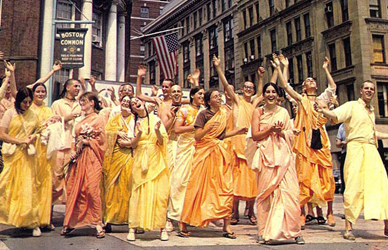In Their Faces
By Mukunda Goswami | Aug 09, 2012

Since the novelty has worn off, ISKCON has dropped off screens.
It was contrary to Srila Prabhupada’s principles to be below the radar. It’s also anti-preaching to be so invisible.
In 1980, Robert C. Pritikin wrote and published a book called “Christ Was as Ad Man”. In that book he writes that at one point the San Francisco (California, USA) Ballet Company was so financially destitute, that it was on the verge of collapse.
Then it was decided to take to the streets. Many of the company’s members started dancing on the wide sidewalks of San Francisco’s central avenue, Market Street. As a result of this, the organization became solvent — and continues to this day. Whether or not this initiative was inspired by harinama sankirtana, one may never know.
But the lesson here is that street activity is valuable.
It’s also a state-of-the-art marketing technique today, to promote communications products on city streets. In many city streets, people are shown photographs of themselves, as a promotional technique to sell more mobile (cell) telephones.
Recently, a book called “Alone Together”, was written by MIT professor Sherry Turkle. In her book, the author cites a case of someone who threatened suicide on Facebook. According to Turkle, none of the potential victim’s facebook “friends” responded to her desperate plea for help.
This is an example of how virtual reality cannot replace personal face-to-face interaction.
As technological advances can lull one into a false sense of security, the need to have personal exchanges is increasingly important.
In a 1982, a best-selling book called “Megatrends,” by Robert C. Naisbitt, one of the chapter titles is “Hi Tech/Hi Touch.” In that section, it is explained how modern technological advances, can never be a substitute for one-on-one exchanges. In fact, Naissbitt opines that the more we withdraw into “virtual reality”, the more we need to have direct contact with other humans.
In a 2009 study done by the London School of Economics (LSE), it was found that the “Happiest Place in the World” was the country of Bangladesh, primarily because here friendships were considered to be more important than anything. (England came in number 32 in LSE’s “World Happiness Survey”. The LSE study and similar analyses found the USA’s ranking to be a dismal 30 and above).
Harinama sankirtana provides an opportunity to benefit millions of conditioned souls not only by hearing, but also by seeing and, in many cases, interacting with devotees.
The need to be “in their faces” is, in 2012, more important than ever.















